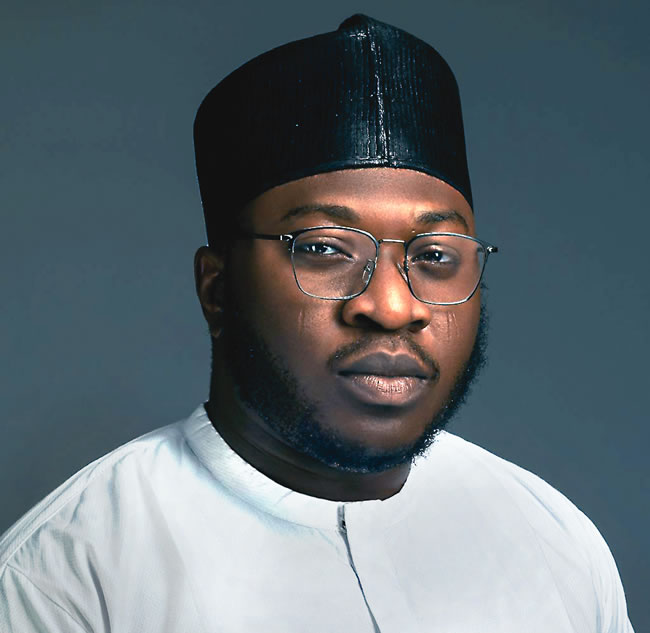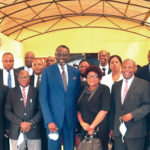Olubunmi Ayantunji is a legislative draftsman and convener of the Policy Roundtable, a nongovernmental, policy conversation centered organisation that operates with the mandate to arm every citizen with the right information on government policies, legislations and whitepapers. In this interview with NIYI ALEBIOSU, he shares insights on the work of the organisation, his vision for Nigeria and other issues.
As a qualified lawyer, you identify as a legislative draftsman. What informed your choice of career?
First of all, I think whatever career path or choice that I have made could not have been fruitfully possible without the study of law. The study of law literally prepares you for every vocation and majorly as it relates to governance. After leaving the Nigerian Law School, I knew I wasn’t cut out for conventional law practice, as engaging and productive as it is. I have always wanted to be involved in governance and the processes of legislation. Thankfully, I got a job about a year after my mandatory youth service to work for one of the most forward thinking legislators in the country and it has been fulfilling as the learning process never stops.
The process of drafting legislations, researching into laws and white papers and couching policies have become really fulfilling for me and it has become what i enjoy doing, hence the choice of the vocation as a career path. Over the years, I have been opportune to learn albeit physically some democratic actions and processes that I have before now learnt only in theory. I have understudied experienced legislators and administrators in the Legislature and the learning process though tough has been hugely fulfilling for me.
What is the foundation for the formation of the Policy Roundtable?
I believe that you cannot defend a right you do not know and the only remedy to ignorance still remains knowledge. Before the young persons and in fact the citizens of this country can hold the government accountable for a wrong, they need to know the laws, regulations and even the rationale behind the same. A people that are armed with the right information cannot be taken for granted, and an army of ignorant people is dangerous. The Policy Roundtable operates to hugely simplify policies and governmental legislations for the easy consumption of the citizenry, asides this, we gather a sizable number of young persons’ drawn across all strata in our monthly sessions, where we teach, discuss and converse on policies of government. At the Policy Roundtable session, we have had Senior Advocates of Nigeria, about four of them, we have had Professors and highly revered members of the academic community and we have had heads of MDAs, former government appointees and even elected representatives. Our sessions are always very intellectually stimulating and productive as citizens’ converse without sentiments under a healthy roof.
What are the effects of your sessions on the young persons in the country and how will you quantify the impacts?
Our sessions have had very awesome testimonies from participants, as our reviews and reports are overwhelming each time. At the Policy Roundtable, we believe in the principle of replication and little drops of water, this means that we believe if we can influence a young person and arm him or her productively he or she goes ahead to influence his/her immediate networks and the chain continues, we are of the firm believe that unlike ignorance, knowledge spreads slower, and we are strategically targeting young persons to know more about events, policies and what is currently happening in the polity, so that can make informed decisions when it concerns their home country. You need a great knowledge of the country to choose leaders(vote), to criticize or advise the government and to even perform basic civic functions. All these are what we have taken up to do for free for the citizens of the country, of course sharing from the little we have given. No man possesses a thing without it being given to him and from the little we know, from our little knowledge occasioned by where God has strategically placed everyone one of us at the Policy Roundtable, we have thought it right to also influence our neighbors.
Every session we receive messages, mails and comments of people telling us about what they just learnt about the country and how they have erroneously held on to certain inimical narratives and how they will fix up going forward, that spurs us to do more. We have students who have attended our sessions and have invited their friends to also come for the subsequent sessions. We have a long standing partnership currently with the National Association of Political Science Students in Nigeria and they select different students to attend our practically informative sessions monthly. We have also had other organizations reach out to us for same but then we can only take as much, as the Policy Roundtable is self funded and we hope to get donors and funders to support our reach across the six geopolitical zones in the country. What we do is for country and we are not relenting or backtracking!
How has your work at the Nigerian Senate aided your career trajectory?
Working in the Nigerian Senate has not only helped my career trajectory, it has reshaped my knowledge of parliamentary process and deepened my thoughts on the political system. I work with one of the most hardworking and cerebral legislators in the Nigerian senate today, and that alone keeps me on my toes as regards getting better each day at the Job. Of course as a young lawyer I had to learn very fast on the job, which I believe I had done well at and again I wouldn’t divorce my principal’s demand for the best always from my modest success so far.
My work at the Apex Legislative Institution also made me realize the lacuna and huge gap in information between the governed and the people taking the decisions and of that obviously birthed the idea of the Policy Roundtable as an organization to not just simplify these policies to an average Nigerian but also make them readily available and easy to read for citizens. I have come to understand that against the popular notion that Nigerians have against their legislators, they actually put in a whole lot of work behind the legislative activities of standing in the chambers to voice their opinions and demands….a whole lots of work goes down behind the scenes, a whole lot of work. So my work at the Senate has been insightful, rewarding and hugely impactful. All thanks to God.
What are your thoughts on the constant push for young persons’ to be involved in governance?
First of all, l belong to the group that postulates that good governance is not a function of age but a function of what I have tagged the three Cs. I believe what makes a great leader are those indicators and they are ; Competence, Character and Courage. A leader or anyone that wants to represent the interest of the people at any level of governance must be Competent academically, Intellectually and in ability, we have too many accidental public officers in the country and they come to office without a ability and competence to discharge their constitutional functions this they rely on the propositions of hypocritic sycophants to dance around issues and promulgate policies that are sometimes counter productive. A great leader must have a positive Character . It was Catherine Pulsifer that said our character defines who we are by the actions we take, and I agree with her postulation. Character is everything. I attend the University of Benin and we were constantly told while in school that we are not being examined through exams alone but our characters form part of our “results” hence when the University gives you your certificate, they say you have been found fit in Learning and Character!….this shows the extent of how character matters in every man’s life not to talk of a prospective leader’s life.
Lastly,a people without a Courageous leader is better off having no leader at all. A good leader should know when to take tough decisions and when to be bold. The late former governor of Oyo State (Gov. Abiola Ajimobi) has a favourite quote on leadership and I will never forget, he’d say “a good leader takes the people to where they want; a great leader takes the people to where they should be”. That is courage; that is a leader
Summing up all the indices I have said above, any candidate that has that earns my vote irrespective of age or standing. However, it is clear that we need more young persons in elective and appointive positions in Nigeria and I earnestly support the emergence of that trend and I have jumped on it too.
You have high hopes for the country in spite of seeming disbelief in the system, why?
As with every developing country with their extant peculiarities, Nigeria will by nature of “evolution” get better. As we grow older, we will adapt to the realities that our institutions are and should be stronger than private humans, politics (which is regarded as a goldmine) will become less lucrative as that is currently happening and this phenomenon automatically sieves out selfish candidates and soon only serious persons will aspire for public offices as the pecuniary gains are now limited. Also,the young persons of this country are already doing wonderfully in Fintech, Innovations and in Academia. Look at Flutterwave and the amount they turn over yearly, look at Abeg, and the rest in that league. It might interest you to know that in 2021, 102 Nigerian startups raised $1.09 billion, and 73.5 percent went to startups in the Financial Services space. The closest industry to Financial Services was eCommerce (marketplace) with 13.8 percent. Two fintech startups each raised 9 digits in dollars, 6 of the 13 Nigerian startups that raised 8 digits were also fintechs.
This is to show that the young persons of this country are going beyond mere rhetoric to reshape the historical and economic trajectory of the country and these they are doing with waning support from the government. I need not say more than this for anyone to believe that this country will work and it will, in our time.
How has the reception being from your target audience and Nigerians?
Awesome and quite encouraging, the testimonies that we get from each session form the force that inspire us to do more at the Policy Roundtable. Knowledge is what we hold as a “weapon” and it has helped us a great deal. We have had students from nearly all the Universities in Abuja (Private and Public) we have partnered student associations and private organizations and the recommendations stemming from our sessions has been nothing but very productive.
We hope to extend our frontiers to other states soon and we are also making plans to inculcate the principles of patriotism and civic knowledge into teens through our Teens Legislative and Policy Bootcamp. Our plans are massively enormous but I won’t want to talk about them yet as they are still at the Directorate decision making level.
ALSO READ FROM NIGERIAN TRIBUNE
- Bandits Storm Kaduna Airport, Stop Aircraft From Taking Off
- Lagos Socialite Who Distributed Petrol As Souvenir Sentenced To Two Years Imprisonment, Gets Fine Option
“Absolutely, When we came with the Buhari government in 2015 I became the minister. We were committed to a roadmap to establish a National Carrier, to concession the airports, to set up a leasing company, to establish cargo facilities and we have been doing that.”
On why the Buhari government wanted a national carrier, the minister responded: “Nigeria is situated at the centre of Africa, equidistant from all locations in Africa. 30.4 million square kilometres miles, 1.5 billion people, very green land. If Central and Eastern Africa is the belt of the continent, then Nigeria is the buckle. 200 million people and rising middle class, propensity to fly is high. Nigeria is a candidate for National Carrier.”
Sirika who insisted that the coming national carrier will be private sector driven added; “Private. Yes. 5 per cent government and no government stepping right in that company, no government control, no membership of government on board. Totally private and committed.
“Whatever we say we will do as a government since 2015, it has happened. that is why Tim Clark of Emirates, Qatar Airways and all of them are looking to go into Nigeria in multiple frequencies and multiple landing points because Nigeria is the right place for the airline business.
How Workplace Sexual Harassment Forces Many Out Of Their Dream Jobs
FG expresses commitment towards private driven aviation sector






